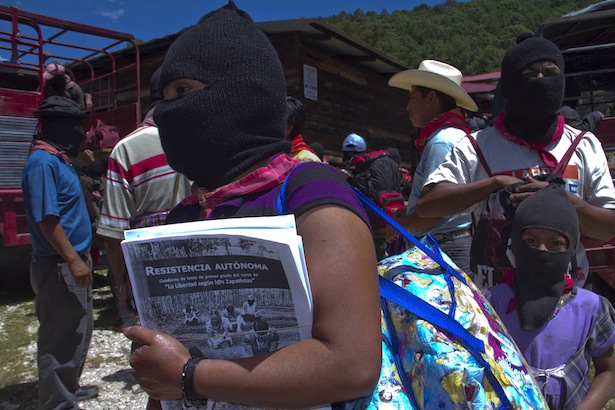by RAUL ZIBECHI
(translated by CHIAPAS SUPPORT COMMITTEE
 On 12th August, 2013, 1,700 students from around the world enrolled in the first Zapatistas school held at the University of the People’s Land of Chiapas. PHOTO/WNV/MOYSES Zuniga Santiago/Intercontinental Cry Magazine
On 12th August, 2013, 1,700 students from around the world enrolled in the first Zapatistas school held at the University of the People’s Land of Chiapas. PHOTO/WNV/MOYSES Zuniga Santiago/Intercontinental Cry Magazine
There will be a before and after the Little Zapatista School; of the recent one and those that will come. It will be a slow, diffuse impact, which will be felt in some years but will frame the life of those below for decades. What we experienced was a non-institutional education, where the community is the educational subject. Face-to-face self-education; learning with the spirit and with the body, as the poet would say.
It’s about non-pedagogy inspired in campesino culture: selecting the best seeds, scattering them on fertile ground and watering the earth so that the miracle of germination produces, which is never certain nor can it ever be planned.
The Little Zapatista School, for which more than a thousand students went into autonomous communities, was a different way of learning and teaching, without classrooms or blackboards, without teachers or professors, without curriculum or qualifications. Real teaching begins with the creation of a climate of fellowship (hermanamiento) among a plurality of subjects, previously with division between an educator with power and knowledge, and ignorant students in whom knowledge must be inculcated.
Among the many apprenticeships, impossible to sum up in a few lines, I want to emphasize five aspects, perhaps influenced by the conjuncture that we are crossing through in the continent’s south.
The first is that the Zapatistas defeated the social counterinsurgency policies, which are the way found by those above for dividing, coopting and submitting peoples that rebel. Side by side with each Zapatista community are communities related to the bad government with their little cinder-block houses, who receive cash certificates and hardly work the land. Thousands of families succumbed, something common everywhere, and accepted gifts from above. But, what’s notable and exceptional is that other thousands continue forward without accepting anything.
I don’t know of another process in all of Latin America that has been able to neutralize the social policies. This is a major virtue of Zapatismo, attained with militant firmness, political clarity and a never-ending capacity for sacrifice. This is the first lesson: it is possible to defeat the social policies.
Upside Down World for more
